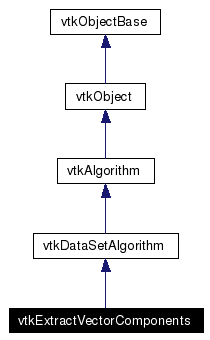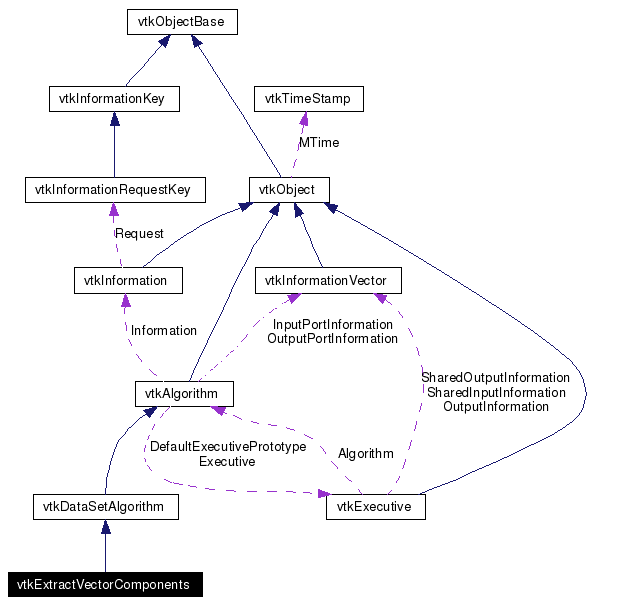vtkExtractVectorComponents Class Reference
#include <vtkExtractVectorComponents.h>
Inheritance diagram for vtkExtractVectorComponents:
 [legend]Collaboration diagram for vtkExtractVectorComponents:
[legend]Collaboration diagram for vtkExtractVectorComponents: [legend]List of all members.
[legend]List of all members.
Detailed Description
extract components of vector as separate scalars
vtkExtractVectorComponents is a filter that extracts vector components as separate scalars. This is accomplished by creating three different outputs. Each output is the same as the input, except that the scalar values will be one of the three components of the vector. These can be found in the VxComponent, VyComponent, and VzComponent. Alternatively, if the ExtractToFieldData flag is set, the filter will put all the components in the field data. The first component will be the scalar and the others will be non-attribute arrays.
- Warning:
- This filter is unusual in that it creates multiple outputs. If you use the GetOutput() method, you will be retrieving the x vector component.
- Tests:
- vtkExtractVectorComponents (Tests)
Definition at line 43 of file vtkExtractVectorComponents.h.
Member Typedef Documentation
Constructor & Destructor Documentation
| vtkExtractVectorComponents::vtkExtractVectorComponents |
( |
|
) |
[protected] |
|
| vtkExtractVectorComponents::~vtkExtractVectorComponents |
( |
|
) |
[protected] |
|
Member Function Documentation
|
|
Create an object with Debug turned off, modified time initialized to zero, and reference counting on.
Reimplemented from vtkDataSetAlgorithm. |
| virtual const char* vtkExtractVectorComponents::GetClassName |
( |
|
) |
[virtual] |
|
| static int vtkExtractVectorComponents::IsTypeOf |
( |
const char * |
type |
) |
[static] |
|
|
|
Return 1 if this class type is the same type of (or a subclass of) the named class. Returns 0 otherwise. This method works in combination with vtkTypeRevisionMacro found in vtkSetGet.h.
Reimplemented from vtkDataSetAlgorithm. |
| virtual int vtkExtractVectorComponents::IsA |
( |
const char * |
type |
) |
[virtual] |
|
|
|
Return 1 if this class is the same type of (or a subclass of) the named class. Returns 0 otherwise. This method works in combination with vtkTypeRevisionMacro found in vtkSetGet.h.
Reimplemented from vtkDataSetAlgorithm. |
| void vtkExtractVectorComponents::PrintSelf |
( |
ostream & |
os, |
|
|
vtkIndent |
indent |
|
) |
[virtual] |
|
|
|
Methods invoked by print to print information about the object including superclasses. Typically not called by the user (use Print() instead) but used in the hierarchical print process to combine the output of several classes.
Reimplemented from vtkDataSetAlgorithm. |
| virtual void vtkExtractVectorComponents::SetInput |
( |
vtkDataSet * |
input |
) |
[virtual] |
|
| vtkDataSet* vtkExtractVectorComponents::GetVxComponent |
( |
|
) |
|
|
|
|
Get the output dataset representing velocity x-component. If output is NULL then input hasn't been set, which is necessary for abstract objects. (Note: this method returns the same information as the GetOutput() method with an index of 0.) |
| vtkDataSet* vtkExtractVectorComponents::GetVyComponent |
( |
|
) |
|
|
|
|
Get the output dataset representing velocity y-component. If output is NULL then input hasn't been set, which is necessary for abstract objects. (Note: this method returns the same information as the GetOutput() method with an index of 1.) Note that if ExtractToFieldData is true, this output will be empty. |
| vtkDataSet* vtkExtractVectorComponents::GetVzComponent |
( |
|
) |
|
|
|
|
Get the output dataset representing velocity z-component. If output is NULL then input hasn't been set, which is necessary for abstract objects. (Note: this method returns the same information as the GetOutput() method with an index of 2.) Note that if ExtractToFieldData is true, this output will be empty. |
| virtual void vtkExtractVectorComponents::SetExtractToFieldData |
( |
int |
|
) |
[virtual] |
|
|
|
Determines whether the vector components will be put in separate outputs or in the first output's field data |
| virtual int vtkExtractVectorComponents::GetExtractToFieldData |
( |
|
) |
[virtual] |
|
|
|
Get the output dataset representing velocity z-component. If output is NULL then input hasn't been set, which is necessary for abstract objects. (Note: this method returns the same information as the GetOutput() method with an index of 2.) Note that if ExtractToFieldData is true, this output will be empty. |
| virtual void vtkExtractVectorComponents::ExtractToFieldDataOn |
( |
|
) |
[virtual] |
|
|
|
Get the output dataset representing velocity z-component. If output is NULL then input hasn't been set, which is necessary for abstract objects. (Note: this method returns the same information as the GetOutput() method with an index of 2.) Note that if ExtractToFieldData is true, this output will be empty. |
| virtual void vtkExtractVectorComponents::ExtractToFieldDataOff |
( |
|
) |
[virtual] |
|
|
|
Get the output dataset representing velocity z-component. If output is NULL then input hasn't been set, which is necessary for abstract objects. (Note: this method returns the same information as the GetOutput() method with an index of 2.) Note that if ExtractToFieldData is true, this output will be empty. |
|
|
This is called by the superclass. This is the method you should override.
Reimplemented from vtkDataSetAlgorithm. |
Member Data Documentation
The documentation for this class was generated from the following file:
Generated on Mon Jan 21 23:43:48 2008 for VTK by
 1.4.3-20050530
1.4.3-20050530



 1.4.3-20050530
1.4.3-20050530